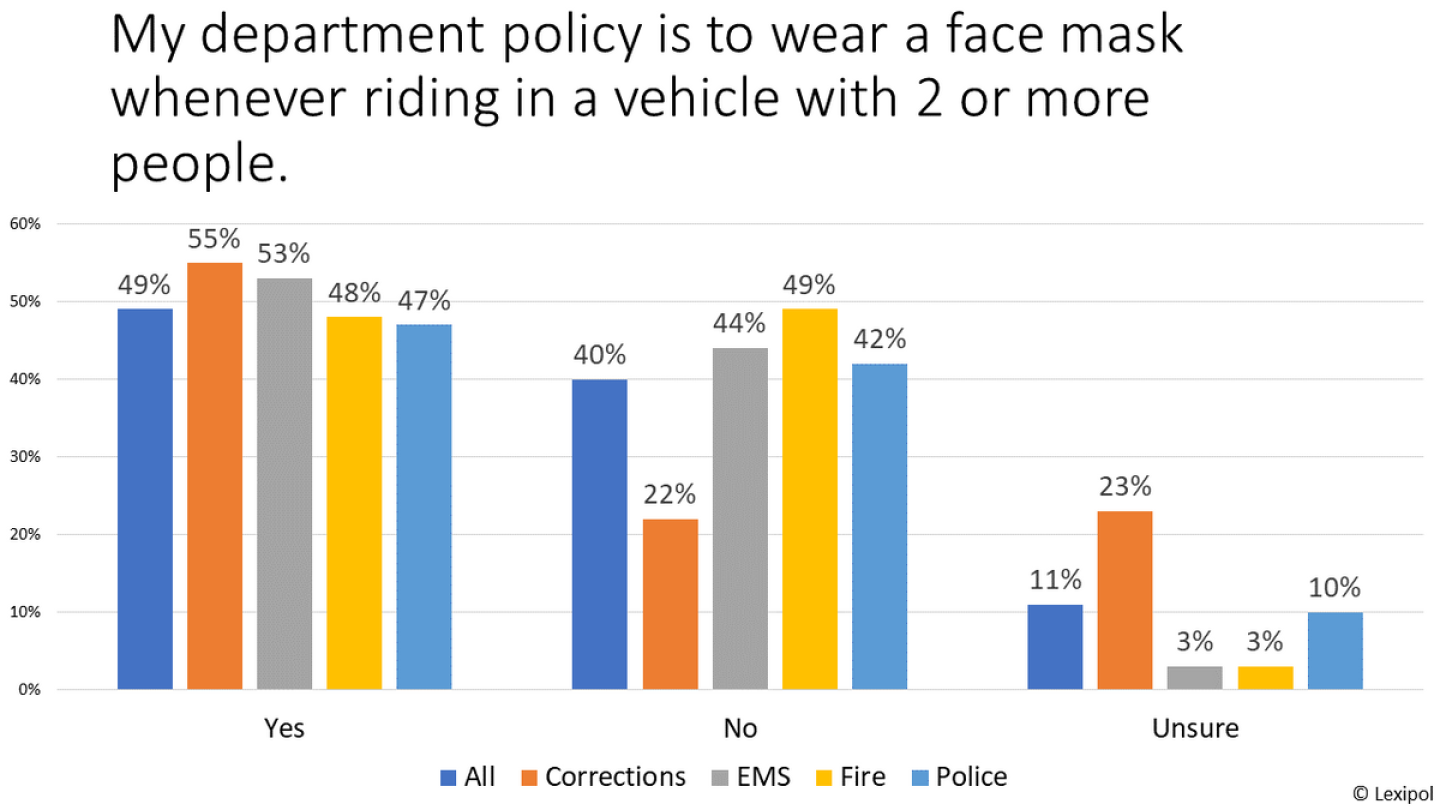The use of face masks to stem the spread of COVID-19 has been a divisive topic, from government officials, to public safety entities, and the general public. Messaging from public health agencies has shifted throughout the pandemic, as to the efficacy of different types of face masks in protecting wearers and those they encounter.
Early on, EMS providers faced supply chain issues resulting in mask shortages and re-use and extended use guidelines to stretch their supply of N95s.
Though face mask wearing is still contested and not all states and communities have mandated mask wearing in public, many have, and many retailers and local business have implemented their own requirements.
Public safety professionals are uniquely impacted, with their daily interactions with COVID-19 potentially positive members of the public, and scrutinized, from their position as partners with public health, or, in the case of law enforcement officers, as mandate enforcers.
According to the Centers for Disease Control and Prevention, mouth and nose-covering face masks are important to reducing the spread of COVID-19. A mask, worn by an infected individual, reduces the dispersion of droplets. Some experts now believe masks of any type, including cloth or paper, may reduce the inhalation of virus-laden droplets or airborne viruses and the potential severity of infection.
EMS1, FireRescue1, Police1 and Corrections1 surveyed public safety personnel nationwide to determine the prevalence of policies related to face masks as a form of PPE during the COVID-19 pandemic, what’s included in those policies, and the opinions of public safety providers about mask use on- and off-duty.
We received nearly 4,000 responses, approximately 430 from EMS providers.
Following are three insights from the survey results. Click here for an in-depth analysis of the findings.
1. Only half of respondents report a policy regarding multiple occupancy vehicles
Just under half of all respondents (49%) reported a department requirement to wear a face mask whenever riding in a vehicle with two or more occupants. The low response from EMS respondents (55%) is especially surprising. Another 11% of all respondents were unsure if their department requires wearing a mask in a vehicle with two or more people. This represents an opportunity to clarify a face mask policy, alter the policy if needed, and ensure the policy is clearly communicated to all personnel.
The American Ambulance Association recently conducted a membership-wide survey that included face mask wearing and PPE protocol compliance. Rob Lawrence, Chair of the AAA Communications Committee, told EMS1, out of the 108 responding agencies representing 38 states, over 60% of agencies identified that they are finding it necessary to frequently remind staff to adhere to PPE and mask wearing practices and procedures. “The reason for this is that over half of our respondents reported lapses,” Lawrence noted. “We wish to stress that complacency is dangerous and can affect the individual, their crew mates and beyond.”
2. Few agencies have a policy mandating off-duty face mask use
It is not unprecedented for a department policy to address off-duty behavior, such as alcohol consumption or drug use, especially when off-duty behavior can impact on-duty performance. We asked respondents, “Does your department policy, directive or standard address off-duty mask wearing?” More EMS respondents reported an off-duty face mask policy than other disciplines – 13% versus 8% overall.
Given the increase of state and local mask requirements, it may be unnecessary for a public safety agency policy to specifically address the off-duty use of a face mask, though it is reasonable a chief, infection control officer or operation director would encourage all personnel to vigilantly practice handwashing, social distancing and face mask use off-duty at home and in public places to control the spread of COVID-19 and maintain a healthy workforce.
3. Public safety disciplines are split on off-duty mask wearing
Off-duty face mask use by public safety respondents is likely a reflection of their perceptions about a face mask’s ability to keep a person safe and prevent the spread of COVID-19.
Off-duty public safety mask use is lower than the general population. An NBC/SurveyMonkey poll, reported July 28, 2020 found “a strong majority of adults say they regularly wear masks. Sixty-eight percent of adults say they wear masks ‘every time’ they leave home and may be in contact with others, 16 percent say they do so ‘most of the time,’ 10 percent say they wear masks ‘some of the time,’ and just 5 percent say ‘never.’”
In the EMS1 survey, two-thirds (66%) of all respondents report wearing a face mask off-duty in a public place. Off-duty mask use is highest with EMS (77%) respondents and lowest with police (37%) respondents.
“We must recognize that the ‘new normal’ is now normal and mask wearing and PPE protocol compliance is an essential and lifesaving part of normal daily working,” Lawrence said.
Learn more about public safety face mask policy, compliance
Learn how your organization compares to other public safety agencies, and where clarification and reminders could support face mask policy by reading the rest of the results. Get the full survey results and analysis here.




